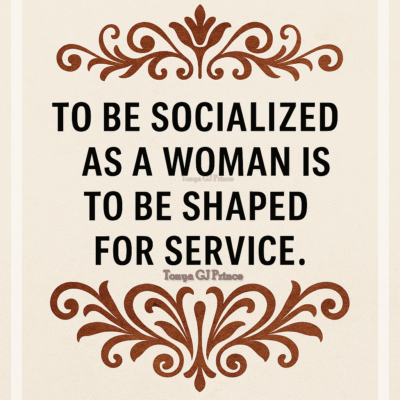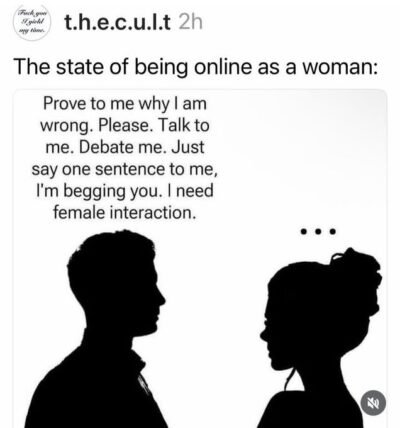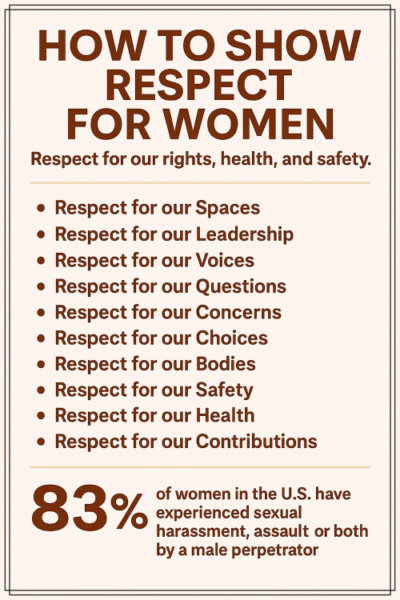To be socialized as a woman means to be trained — subtly and overtly — in what the world expects from those born female. It’s a lifetime of unspoken l
To be socialized as a woman means to be trained — subtly and overtly — in what the world expects from those born female. It’s a lifetime of unspoken lessons, reinforced through family, school, religion, media, and community.
From the moment she can walk and talk, a girl is taught the art of adjustment.
She learns how to read a room before she learns how to read a map.
She learns to apologize for things she didn’t do.
She learns that her worth is reflected in her ability to help, to comfort, to fix, to yield.
To be socialized as a woman is to be taught that love must always cost you something — your rest, your voice, your truth.
It is to be trained in service long before you learn self.
And when that training runs deep, even abuse can look like responsibility.
Let’s walk through the emotional and social layers of it:
🌱 1. Early Conditioning: The Lessons in Softness
From the earliest years, girls are taught to be silently pleasing.
We’re told to smile even when we’re uncomfortable.
To be helpful, gentle, and kind — even when others are not.
To be grateful, even when we are shortchanged.
We’re rewarded for compliance, for tidiness, for empathy.
When we assert ourselves, we’re told we’re bossy.
When we protect our boundaries, we’re told we’re mean.
So we learn to soften our tone, dim our light, and shrink our needs to fit other people’s comfort.
🪞 2. Body Training: Ownership and Display
Girls quickly learn that their bodies are public conversation.
Family, strangers, and the media all weigh in on what to wear, what to hide, what to show, and what to change.
We’re praised for beauty before we’re praised for brilliance.
We’re taught to monitor our shape, our skin, our smile.
Being socialized as a woman means learning to anticipate the gaze — adjusting before anyone asks.
We are told to be “modest” yet “desirable,” “strong” yet “not intimidating.”
Our physical safety becomes our personal responsibility, even when the danger comes from others’ actions.
💬 3. Emotional Labor: The Unpaid Curriculum
Women are taught that we are the emotional caretakers of the world.
We soothe, manage, explain, apologize, anticipate.
We are expected to forgive easily, forget quickly, and empathize endlessly.
Even when someone harms us, we are told to understand why they did it.
We become translators of pain — turning other people’s cruelty into excuses.
And if we stop doing that, we are accused of lacking compassion.
🕊️ 4. Silencing Disguised as Strength
Girls learn that survival requires silence.
We are told to “pick our battles.”
To avoid “drama.”
 To “stay calm” even in injustice.
To “stay calm” even in injustice.
This is how we are trained to confuse suppression with strength.
We begin to believe that being “strong” means not crying, not asking for help, not naming what hurts.
We inherit generations of women who endured instead of being believed.
🔥 5. Unlearning: The Sacred Rebellion
To heal from this socialization is not rebellion — it’s reclamation.
We begin to recognize the invisible curriculum:
that being a “good woman” was too often code for being self-sacrificing, silent, and accommodating.
Unlearning means choosing wholeness over approval.
It means saying no even when the world calls it rude.
It means honoring your safety, your joy, your truth — without apology.
To be socialized as a woman is to be shaped for service.
To awaken as a womanist is to remember you were born for freedom.
Affirmation:
I was trained to please, but I am learning to live.
My boundaries are not rebellion — they are restoration.